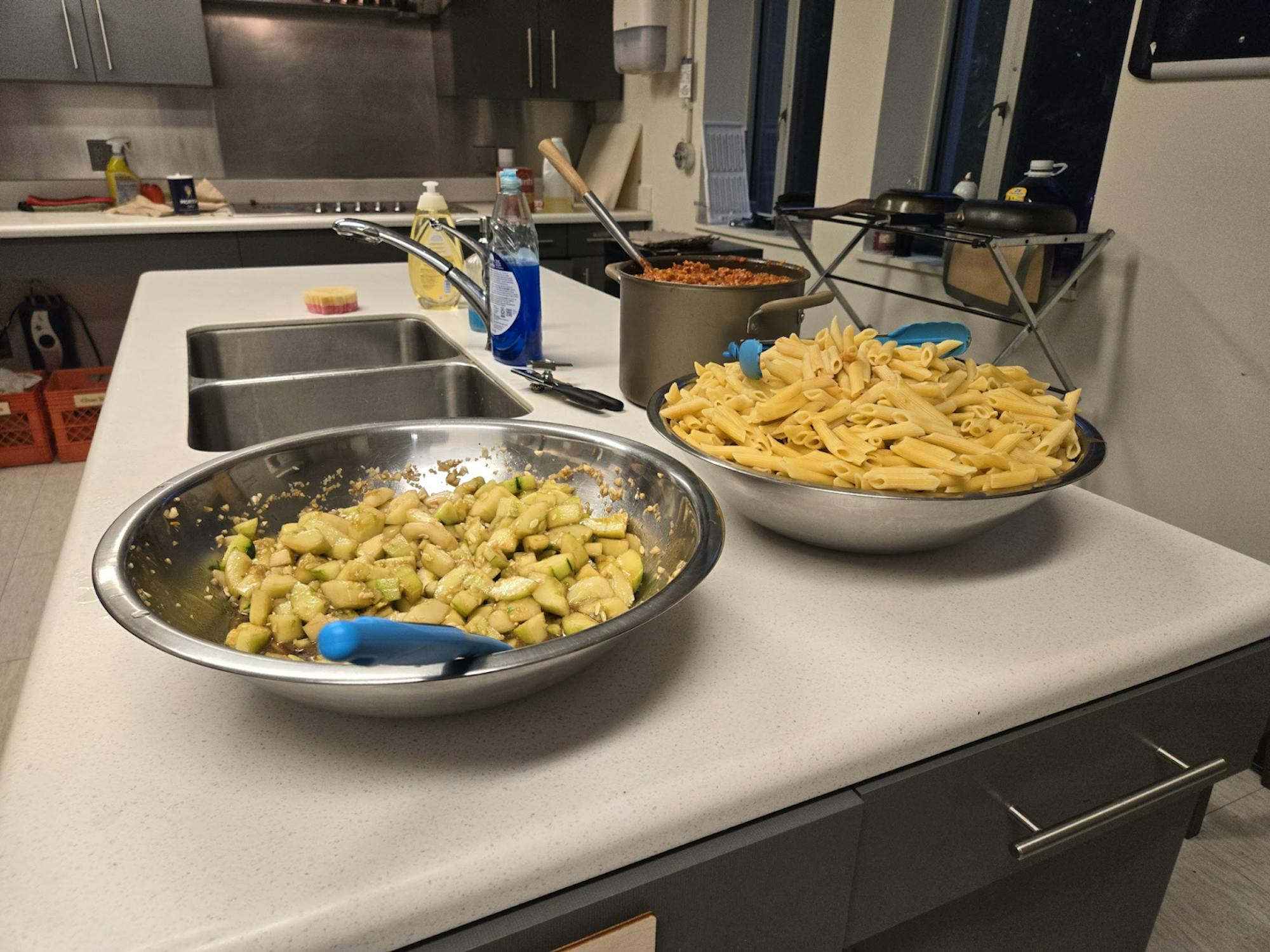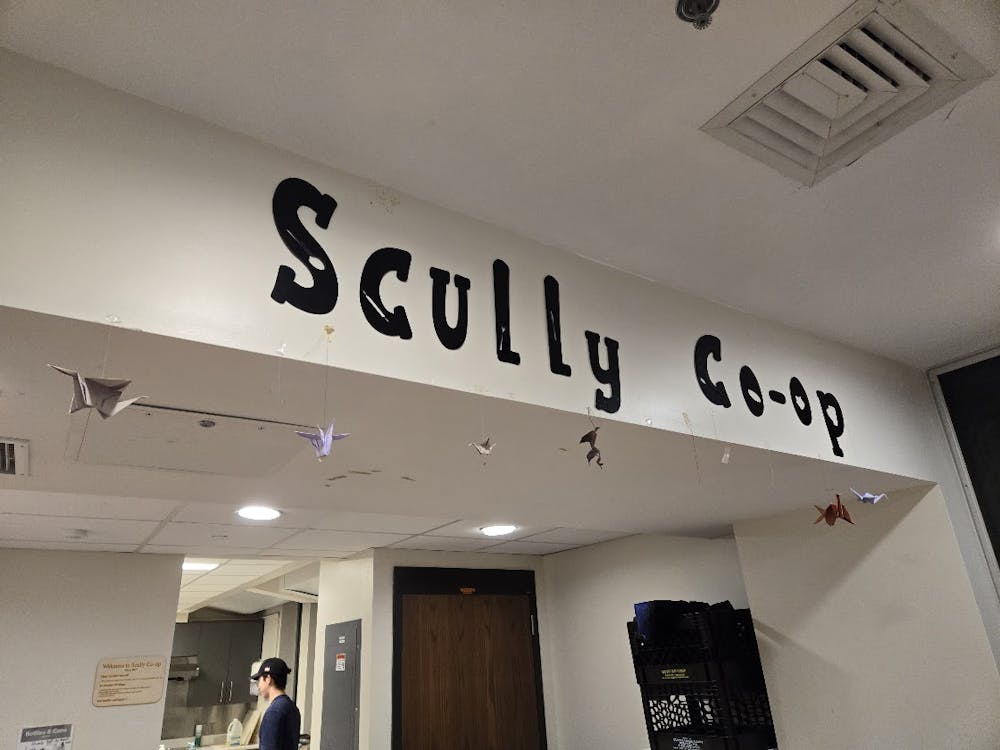When you walk through an unassuming door on the third floor of Scully Hall around 6:30 p.m., you’ll find a group of twenty or so upperclass students talking and laughing over a mix-and-match collection of bowls filled with meals lovingly cooked by five or six members of Princeton’s Scully Co-op.
Co-ops are one of the variety of dining options offered to Princeton upperclass students. Alternatives include the unlimited and Block 105 meal plans, dining plans offered by eating clubs, and going independent. The five co-ops on campus — the Brown Food Co-op, 2 Dickinson St. Co-op (2D), International Food Co-op (IFC), Real Food Co-op, and Scully — are primarily comprised of independent and Block 105 upperclass students who cook one meal a week — either dinner or weekend brunch — with a few other members in the co-op’s private kitchen. The group, which usually consists of about 30 to 40 people, shares a group meal after cooking. Each member pays anywhere from $500 to $650 per semester and receives unlimited access to the co-op’s facilities and supplies.
But what is being in a co-op really like? In order to find out, I spent an evening dining with the Scully Co-op.

Bowls of balsamic-marinated cucumbers and penne pasta, and a pot of bolognese.
Lulu Pettit / The Daily Princetonian
I arrived right at the start of the meal period — 6:30 p.m. The cooks had already been there for two hours preparing penne, bolognese sauce, and balsamic marinated cucumbers. The cooking and dining rooms are connected: A few picnic tables are in the dining area and the small but professional kitchen and pantry. I was one of the first to arrive, but as I served my own plate, people began to trickle in.
When the meal was in full swing, the tables were almost entirely full and the room was loud with friendly conversations. While observing this, I spoke with Scully Co-op’s President Annie Cao ’25. She explained that Scully is like an “ecosystem,” where everyone has roles and jobs assigned to them and everyone supports each other. Along with their cooking shifts, each member has a chore ranging from fridge caretaker to bread maker — along with store-bought loaves, the co-op also has a constant supply of freshly-baked bread. Unlike campus jobs, seniority plays no role in shift assignments. The cooking shift and chore manager of the co-op uses spreadsheets and Google Forms to organize each member’s ideal times and preferred chores to create a balanced and united community.
People have a variety of reasons for joining co-ops. Compared to the eating clubs, they are much smaller, with 36 members in the Scully co-op and a waitlist in the event that anyone drops. Joining is often by word-of-mouth — many prospective members have already heard good things about the co-op. A large portion of the group also lives in or near Scully Hall. Some individuals choose to join for financial reasons or simply because they love to cook.
The cuisine changes every night depending on what the cooks on shift want to make.
“Last year there was a lot of Asian food,” Cao explained. “But this year there’s a lot of different kinds of food.”
Although they’re not the IFC, Scully offers a diverse range of cuisines from around the world. One night might be Italian, and other nights could focus on American, Mexican, Greek food, or more. Members can see what’s on the menu for the week via their Discord channel, where they can also request groceries — for a cooking shift, snacks, or other meals — and communicate scheduling.
The rules in a co-op are much more relaxed than any other dining option on campus. Packing away leftovers is encouraged and members don’t have an official guest limit — although the cooks on shift might be a bit irked if you walk in with fifteen hungry friends — and you always have open access to the kitchen and pantry.
While we ate, Cao explained to me why she loved being a part of the Scully Co-op.

“My favorite thing about it is the community,” she said.
She talked about built-in social events like game nights and excursions off-campus. Last year, they had a joint picnic with 2D, the vegetarian and vegan co-op. Emphasizing the close-knit nature of the group, other members would occasionally join in the conversation to make a joke or answer a question I asked. Sitting at picnic tables with a home-cooked meal, with handmade decorations like the paper cranes hanging above us, it almost felt like a summer camp.
Cao recently joined another community traditionally brought together through dining: Charter Club. However, her membership in the eating club has not affected her participation in or leadership of the co-op.
As the meal came to a close, members of the co-op slowly trickled into the kitchen to clean their dishes and get themselves a scoop of mango sorbet from a large tub that had been taken out from the freezer. They stood around the kitchen island counter eating ice cream, chatting, and slowly putting the food in Tupperware, which they labeled with the date.
Scully, and all of the co-ops at Princeton, are unique, hands-on dining experiences. They offer a smaller, more close-knit social group than what you might find in an eating club, while providing more structure than a completely independent meal plan and more action than the dining halls. They might not be the most common dining style here on campus, but they have their own unique perks and strong communities.
Lulu Pettit is a member of the Class of 2027 and a staff writer for The Prospect from the suburbs of Philadelphia. She can be reached at lp3153[at]princeton.edu or her Instagram [at]itslulupettit.
Correction: A previous version of this piece incorrectly stated that Cao had left the Scully co-op upon joining Charter.









